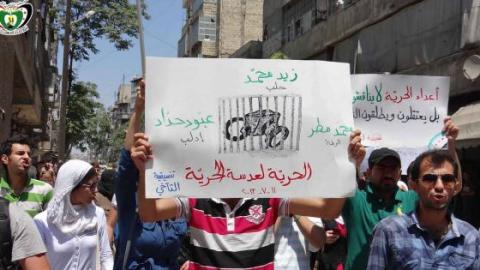In response to the regime's rigorous attempts to create a rift in the Syrian social fabric, a group of young Arab and Kurdish activists formed the Kurdish-Arab Fraternity Coordination Committee. The coordination committee was established in November 22, 2011 to unite many groups that were present at the time, including, the Young Kurds Committee, al-Ashrafiyeh Committee, Kurd Assembly and Aleppo Committee, all of which have a record in civil activism within the Uprising.
In its early days the committee wanted to “focus on the brotherhood between Arabs and Kurds, because we are one despite the regime's attempts to establish a state of ethnic division during the last four decades,” as one of the committee's activists says in an interview with Syria Untold. Now however, this objective has expanded and grown to include all components of the Syrian community, especially after university students of different background (Alawites, Armenians. Christians, Mardells) joined in as part of the group, fighting side by side to obtain their freedom and overthrow the sectarian regime.
Since its formation, the committee has launched and participated in a large number of activities and campaigns that aim to spread awareness and urge people to embrace the diversity within Syrian society. Additionally, they were part of almost every protest that took place in Aleppo, since their main objective was to activate the civil movement in Aleppo, which was one of the latest cities to join the Uprising. After the Free Syrian Army entered Aleppo, most civil groups were unable to operate due to security concerns, but that didn't stop the committee from contining its work, adding to its long list of activities: aid and relief, and helping in rescue operations for injured civilians and FSA fighters.
The instability of the group's members is what they articulate as their biggest problems, “activists from the Alawite sect working in our team are currently subjected to sectarian harassment carried out by the FSA,” an activist says, “additionally, we are having financial hardships, that's why our recent activities are low-budget.” One of the Committee's founders, Kamal, was detained in late 2012 by the Air Force Intelligence while working in a school sheltering and aiding refugees in al-Ashrafiyeh Neighborhood. Kamal has been missing ever since, which the committee's activists note as their saddest moment.
Nevertheless, they've had some joyful moments as well. One of these was when they conducted an art exhibition in Azadi (freedom) Street. One of the activists involved explained: “the exhibition contained photographs and paintings. We were amazed by the number of people who were interested in the event, we were happy to know Syrians enjoy art even when they're surrounded by death.”




